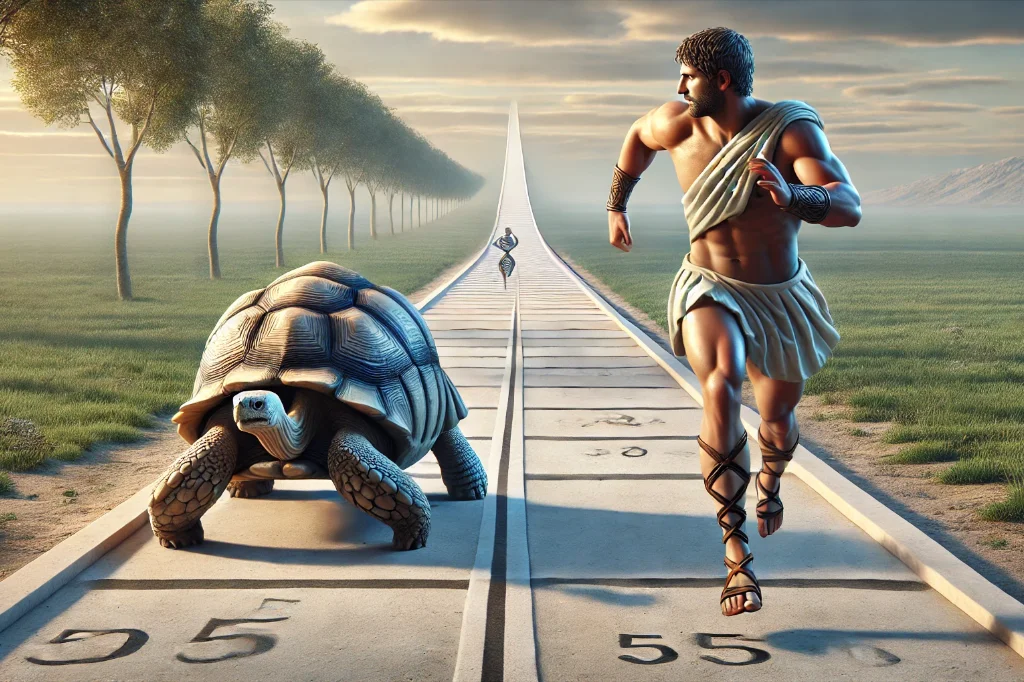Achilles and the Tortoise: The Paradox That Defied Logic
Can an infinite series of steps prevent Achilles from overtaking a slow-moving tortoise? Discover the paradox that challenges our understanding of motion and infinity.
Can an infinite series of steps prevent Achilles from overtaking a slow-moving tortoise? Discover the paradox that challenges our understanding of motion and infinity.
HomeCan an infinite series of steps prevent Achilles from overtaking a slow-moving tortoise? Discover the paradox that challenges our understanding of motion and infinity.

Imagine a race between Achilles, the legendary Greek warrior known for his speed, and a humble tortoise. To make the race fairer, Achilles grants the tortoise a head start. However, as soon as Achilles reaches the tortoise’s starting point, the tortoise has moved a little farther. Each time Achilles reaches the tortoise’s last position, the tortoise has advanced again.
Does this mean Achilles will never overtake the tortoise?
This mind-bending paradox, formulated by Zeno of Elea in the 5th century BCE, has puzzled philosophers, mathematicians, and physicists for centuries. It challenges our fundamental understanding of motion, distance, and the infinite divisibility of space and time.
Zeno’s reasoning follows these steps:
1. The tortoise starts ahead. Let’s say the tortoise has a 10-meter head start.
2. Achilles runs to the tortoise’s original position. By then, the tortoise has moved farther, even if only by a small amount.
3. Achilles reaches the tortoise’s new position. But again, the tortoise has moved slightly ahead.
4. This cycle continues infinitely. Since there are an infinite number of steps Achilles must take, Zeno argues that Achilles can never actually reach the tortoise.
The paradox arises because each step Achilles takes is divided into infinitely smaller distances. If one must complete an infinite number of steps, how can motion ever be completed?
Though the paradox seems insurmountable, mathematics provides an elegant resolution. The distances Achilles must run form a geometric series:
\( S = d_1 + d_2 + d_3 + \dots \)
Where each subsequent distance is a fraction of the previous one. If we assume Achilles runs ten times faster than the tortoise, the distances are:
First step: 10 meters
Second step: 1 meter
Third step: 0.1 meters
Fourth step: 0.01 meters
And so on…
This forms the sum of an infinite geometric series, which converges to a finite limit. The total distance Achilles must cover to reach the tortoise is:
\( S = \frac{10}{1 - 0.1} = \frac{10}{0.9} = \text{11.11 meters} \)
Since Achilles runs much faster, he covers this distance in a finite time, overtaking the tortoise with ease.
Mathematically, the paradox dissolves because the sum of infinitely many decreasing distances can still be finite.
While mathematics resolves the numerical side of the paradox, Zeno’s deeper question remains:
Is motion an illusion? If space and time can be infinitely divided, how do we ever complete a journey?
Can infinity exist in reality? If Achilles has to pass an infinite number of points, how does he ever finish?
Does the paradox expose flaws in human reasoning? Was Zeno highlighting weaknesses in how we conceptualize motion?
Zeno’s paradoxes were designed to support Parmenides’ philosophy which claimed that change and movement are illusions. Even today, these questions remain relevant in modern physics, particularly in quantum mechanics and theories of spacetime.
Physicists argue that motion is continuous rather than discrete steps, resolving the paradox naturally. However, in quantum mechanics and Planck-scale physics, space and time may not be infinitely divisible. This means that Zeno’s paradox might have a deeper relevance in cutting-edge scientific discussions.
In calculus, limits and derivatives provide tools to handle infinite processes, reinforcing that motion is well-defined despite infinite subdivisions.
Achilles does overtake the tortoise, but Zeno’s paradox forces us to rethink our assumptions about motion, space, and time. It highlights how human intuition struggles with infinity, influencing fields from mathematics to physics and philosophy.
Zeno’s paradox remains one of history’s most fascinating thought experiments—proof that a simple story about a race can still challenge our understanding of reality thousands of years later.
Would you have thought Achilles could lose? That’s the power of paradoxes.